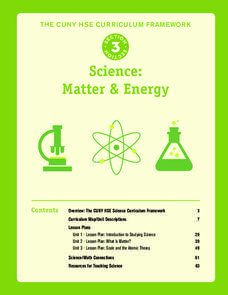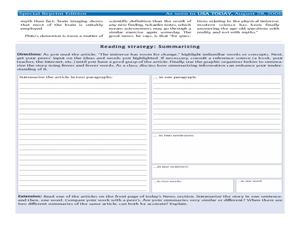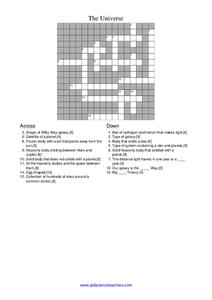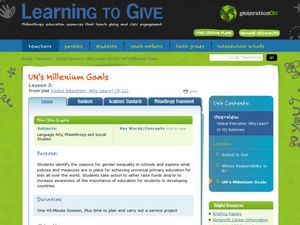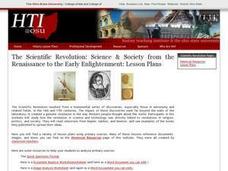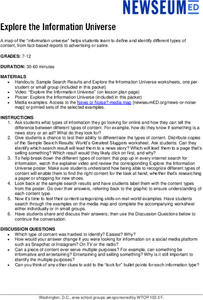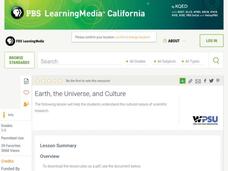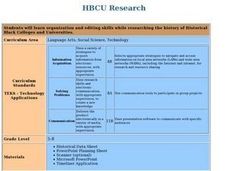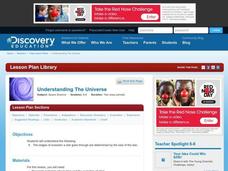National Endowment for the Humanities
Galileo: Revealing the Universe
To gain an understanding of the significance of Galileo Galilei's revolutionary ideas, class members watch the short video "Stargazing Before Galileo," and conduct a close reading of Galileo's Sidereal Messsenger. They then compare...
Curated OER
Taking the Measure of the Universe
Four fabulous activities immerse amateur astronomers into measuring objects that we cannot handle. The experiences are applied to NASA's Space Interferometry Mission, which will take measurements of planets around stars other than our...
Curated OER
Science: Matter and Energy
Designed to use when teaching adults preparing for their high school equivalency exam, the resource integrates reading practice, writing, and analytical thinking in every lesson. The unit covers 23 topics, but it only includes three...
Curated OER
Knowledge Quiz: The Universe
In this universe quiz worksheet, students complete a set of 10 multiple choice questions that cover a variety of concepts about the universe: constellations, black holes, the solar system, etc.
Curated OER
The University of Georgia: Print and Color
In this word recognition worksheet, students trace the words "The University of Georgia", writes the word independently, and color the picture.
Curated OER
The Universe
Students describe what scientists mean by an "expanding universe" in their own words. They explain how scientists comprehend the universie is expanding. Students comprehend the vast scale of the universe. They comprehend how theory...
Curated OER
The Universe Has Room for Change
In this universe and change worksheet, learners read about the demotion of Pluto as one of the 9 planets as well as other changes in science. Students summarize their reading and identify unfamiliar words in the article. Learners...
Curated OER
The Universe
For this space science worksheet, students use the clues given at the bottom of the sheet to complete the crossword puzzle relating to the universe. There are 16 clues to solve in the puzzle.
Curated OER
UN's Millennium Goals
Whose responsibility is it to improve schools in developing countries? How does quality education affect my neighborhood? Questions of responsibility, whether global or local, form the heart of this lesson. Using the UN’s Millennium...
Curated OER
The Scientific Revolution
Scientists participate in studying how new scientific advances have changed the world. They explain how astronomers have changed the way people view the universe, summarize the advances that were made in chemistry and medicine, and...
Curated OER
Throwing, Passing and Signing
Football players break stereotypes by taking sign language classes to fulfill university language requirements. Learners read this article, then respond to six comprehension questions that ask who, what, when, where, how, and why.
Newseum
Explore the Information Universe
Distinguishing among different types of content when conducting online searches can be a challenge. An informative resource helps researchers identify different types of content, from fact-based reports to ads, from propaganda to satire....
EngageNY
Launching Readers Theater Groups: Identifying Passages from Esperanza Rising for Readers Theater that Connect to the UDHR
Teach young readers how to compare two texts and select passages that exemplify a specific theme with Lesson 6 from Unit 3. Begin by modeling how an expert reader selects examples from a text, performing a think aloud on how Article 2 of...
Mr. E. Science
Stars, Galaxies and the Universe
It takes 225 million years for our sun to travel around the galaxy. The presentation covers astronomical units, light years, telescopes, types of stars, the life cycle of a star, and types of galaxies. This is the last lesson in a...
Curated OER
Earth, the Universe, and Culture
Students explore different scientists throughout history. In this scientists and culture lesson students research using the Internet and complete a handout.
Curated OER
ESL: Vocabulary for University Students
In this ESL vocabulary for university students worksheet, students complete multiple choice questions that use "university" vocabulary. Students may click on an answer button for immediate feedback.
Curated OER
Historical Black Colleges and Universities (HBCU) Research
Students, in groups, practice organization and editing skills as they research the history of Historical Black Colleges and Universities (HBCU). they create a PowerPoint presentation of their research.
Curated OER
Spinning into Space
Students, through hands-on activities, teacher demonstrations, pictures, and informational books, complete a unit on the Earth and its place in the Universe. They make mobiles of the Milky Way and watch demonstrations of lunar and solar...
Curated OER
Cinderella Is A Fella
Second graders identify the universal theme in the Cinderella story. In this fairy tale lesson, 2nd graders develop their vocabularies as they read a variation of Cinderella.
Curated OER
Discrimination
Students investigate what discrimination is and study Article 2 from the Universal Declaration of Human Rights. They participate in a role play activity involving majority and minority groups for which a letter was sent home to parents....
Curated OER
Giving Human Rights a Human Face
Students produce a creative expression of an article of the Universal Declaration of Human Rights. They may also create posters to serve as reminders for creating a human rights environment or community.
Curated OER
Taking the Human Rights Temperature of Your School
Young scholars evaluate their school's human rights climate using criteria derived from the universal Declaration of Human Rights. They identify areas of particular concern and develop an action plan to begin addressing the issues.
Curated OER
What Are Your Human Rights?: Post World War II and Human Rights
Students define and discuss human rights, make lists of human rights they think everyone deserves, and create class list of ten most important rights. Students then translate formal language of Universal Declaration of Human Rights into...
Curated OER
The Universe
Students recognize that the stages of evolution a star goes through are determined by the size of the star. They conduct research to draw a set of diagrams illustrating the stages in the evolution of three sizes of stars.




